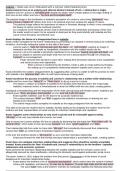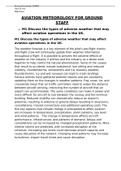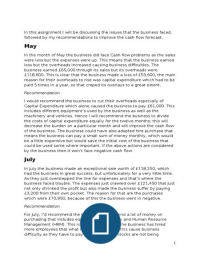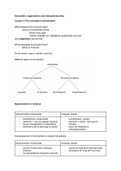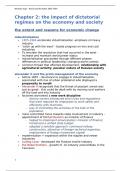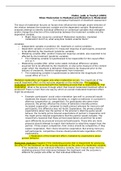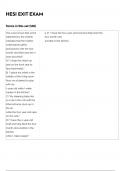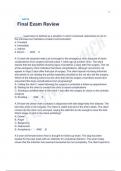Keats presents love as an undying and ethereal abstract instead of lust -> obstruction is tragic.
Isabella’s love for Lorenzo is “not dethroned” despite his death, which creates pathos in the tragic ending of
their love as she suffers and has a “too lone and incomplete death”.
The pastoral image in the focalisation of Isabella’s perception of Lorenzo’s voice being “pleasanter” than
“noise of trees or hidden rill” reflects their love to be ethereal and even surpass the appeal of nature.
- The pastoral image reflects the importance of nature in Romantic ideology in which a love outweighing
the beauty of nature must be endlessly powerful.
- As a response to the Romantic device used to demonstrate the authenticity and beauty of their love,
the reader would not want it to be exposed or destroyed as they would identify with Isabella and the
cause of true Romantic and ethereal Love.
Keats displays the theme of a disappointed love in Isabella.
Keats creates sympathy for the lovers’ relationship by presenting it as requited in several stanzas by switching
focalisers, structurally setting the reader on the side of the lovers.
- Lorenzo waits to “hear her morning-step upon the stairs” with “sick longing”, painting an image of
heartache and thus the couple as sympathetic characters who the readers would root for.
- Lorenzo’s worry for Isabella is physically manifested to his forehead “waxing very pale and dead” with
diction in relation to sickness and death while hers for him is demonstrated through her whispering
“Lorenzo” as encouragement.
- Keats stresses their devotion to each other, making their permanent disunion more sympathetic
and social scrutiny more deplorable.
- When Lorenzo is murdered by the brothers, Keats is able to create pathos by bringing
the setting up of a sympathetic relationship between Isabella and Lorenzo to an end.
Keats intensifies the readers’ disappointment by suggesting that Lorenzo is unable to fulfil his promise to meet
with Isabella in the “amorous dark” after his swift return because of being dead.
Keats transforms the passion in Isabella and Lorenzo’s relationship into a mother-child relationship.
Isabella and her nurse then “labour’d” for “Three hours” to dig up Lorenzo’s corpse.
- The diction in relation to childbirth in parallel to the duration hints that the basil is her ersatz baby.
- Isabella’s maternal instinct is foreshadowed to never be fulfilled with her love dead, creating pathos.
Analogical to breastfeeding and the implantation of the male seed growing with female nurture, Isabella’s pot
of basil grows “thick, and green, and beautiful” as she “ever fed it with thin tears”.
- Keats signifies Isabella’s care for the basil to be a pseudo-maternal act.
- The contrast between “thick” and “thin” suggests that Isabella’s lovesickness is draining her and
leading to her downfall.
- The woeful image evokes sympathy for Isabella as the tragic protagonist from the readers.
This adds to the pity the readers feel for Isabella, thereby adding to the antipathy the readers have for the
brothers and their representation of social scrutiny for interclass relationships and capitalism.
Keats suggests some relationships to only work in private and be vulnerable against reality.
“All close” is the only way Isabella and Lorenzo can meet.
Only in secret can Lorenzo profess his love to Isabella by declaring that she leads him “from wintry cold” “to
summer clime”, which leads to their lips being “poesied” and share “great happiness” and “bliss”.
Their relationship falls from order to chaos after “idle ears” that coincidently discovered their relationship
causes their “woe” as conforming to Aristotelian tragedy conventions.
In the end, the brothers decide to “kill Lorenzo” so as to end their interclass relationship.
- Keats puts forward the idea that having interclass relationships is punishable by death, creating pathos.
Poem does not castigate interclass relationships and suggests they should be socially acceptable
instead. Keats presents the ‘flaw’ of Isabella and Lorenzo’s relationship to be the brothers’ capitalist
callousness and economic cynicism.
Keats presents the interclass relationship between the wealthy Isabella and the servant Lorenzo to be
allegorically doomed by class stratification, reflecting the Romantic revolt against aristocratic social norms.
The poem, written in 1818, adapts the brothers from Boccaccio’s Decameron to fit the theme of social
disapproval for interclass relationships better.
- Keats depicts the brothers to be of “ancestral merchandize”, which makes them the symbol of tainted
money and capitalism, and planning “to coax her by degrees / To some high noble and his olive trees”.
- The word “coax” hints at the brothers’ intention to manipulate Isabella into following what they
, have planned for her, which is to marry into aristocracy.
- As “olive trees” symbolise wealth, Keats portrays Isabella as simply a means for the brothers to
acquire status.
- The word “some” implies the brothers are careless of Isabella’s happiness, providing the noble’s
status is high enough for them.
- Hence, Keats describes the brothers to have become “richer by his being a murderer” after killing
Lorenzo who has a “high conceit of such a bride” as a servant whose socio-economic status is below
them.
- Through the monetisation of Lorenzo’s life, Keats emphasises the destructiveness of the
brothers’ desire for wealth, which caused the couple’s deaths.
- The need to kill Lorenzo the brothers feel highlights the brother’s objectification of Isabella as a
marriage commodity and the value women represent in the 19th century.
- Keats highlights how lowly and worthless society perceives of interclass relationships.
- Keats’ attack on the brothers’ capitalist greed could be in parallel to his aunt’s greed which caused her
to hide his inheritance that would have made him a lot more financially stable from him.
Keats portrays Isabella and Lorenzo to be star-crossed lovers due to their class differences through the
allusion to Romeo and Juliet describing Lorenzo as a “young palmer in Love’s eye”.
- Suggestive of love sickness
- cannot “dwell” in the “self-same mansion” without “some stir of heart” or “malady” -> image of
sickness and suffering.
- “sweet Isabella’s untouch’d cheeks / Fell sick within the rose’s just domain” -> pathetic picture
of a pure, lovesick maiden in distress.
In his authorial intrusion, Keats curses the brothers by calling a plague of “Hot Egypt’s pest / Into their vision
covetous and sly” for being nosy and finding out about Isabella and Lorenzo’s relationship.
- The words “covetous” and “sly” signify the brother’s controlling and manipulative nature.
- His curse upon them highlights his disapproval of social scrutiny for interclass relationships.
Keats criticises societal rules that govern and restrict interpersonal relationships, which could be seen as a
reflection of his inability to pursue higher class women due to class stratification and his lower middle class
background.
- Keats laments how one cannot always marry for love and is under economic pressure to find an
advantageous match.
Isabella’s “kindred” is shocked to find Isabella’s “youth and beauty” that is “mark’d out to be a Noble’s bride” to
have been “thrown aside”.
- As they pity the loss of Isabella’s “youth and beauty”, which are valuable female qualities in marriage,
more than they do for her happiness, it is suggested that her family and brothers simply regret that their
actions have led to the waste of a commodity.
- The lack of intimacy and sympathy in their relationship objectifies Isabella as a means to an end.
The brothers are the clear villains who are physically cruel.
Keats describes the brothers as “blood-hounds of such sin” with gruesome imagery and diction in relation to
the underworld in Greek mythology.
- Keats directly puts forward the idea of the brothers being sinful and “such” amplifies the gravity of their
wrongdoings, presenting their religious morality to be in great contrast with the spiritual innocence of
the lovers they had separated and thus cementing their villainy.
Their workers’ “many a weary hand” “swelt / In torched mines and noisy factories” and “proud-quiver’d loins”
“melt / In blood from stinging whip”.
- Keats’ use of dental sounds stresses the exhaustion of the workers and the brothers’ neglect of it for
the sake of financial gain, highlighting the cruelty of capitalism and colonialism.
Although tragic protagonist Isabella is born of high status, she does not have an identifiable hamartia.
Isabella is a pure and hapless victim of circumstance that is “FAIR”, “poor”, and “simple” with no hamartia,
further emphasising that society is to blame. -> no anagnorisis.
- Keat’s use of adjectives with connotations of innocence and beauty signify Isabella to be innocent of
any flaw.
- Materialist tragedy -> the impact circumstance has on the relationships to be more heartfelt.
- No true catharsis as readers can only be purged with a sense of disdain for the ideologies criticised,
capitalism and class consciousness.
Keats classically compares Isabella to “Dido”, the Queen of Carthage who committed suicide after suffering
unrequited love, creating the image of a wronged woman.

